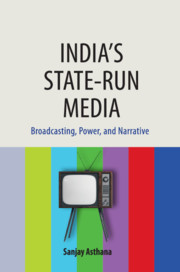Book contents
- Frontmatter
- Dedication
- Contents
- List of Figures and Tables
- Acknowledgements
- Introduction
- 1 Broadcasting, Spatiotemporalities, and Power
- 2 Doordarshan, Literary Drama, and Narrative Identity
- 3 Televisual Representations of Socio-Spatial Conflicts, and the Religious–Secular Imaginaries
- 4 Patriotism and Its Avatars: Tracking the National–Global Dialectic in Music Videos and Television Commercials
- 5 Remembering Doordarshan: Figurations of Memories and Nostalgia on Blogs, YouTube, and in Oral Interviews
- Epilogue
- Bibliography
- Index
5 - Remembering Doordarshan: Figurations of Memories and Nostalgia on Blogs, YouTube, and in Oral Interviews
Published online by Cambridge University Press: 08 May 2019
- Frontmatter
- Dedication
- Contents
- List of Figures and Tables
- Acknowledgements
- Introduction
- 1 Broadcasting, Spatiotemporalities, and Power
- 2 Doordarshan, Literary Drama, and Narrative Identity
- 3 Televisual Representations of Socio-Spatial Conflicts, and the Religious–Secular Imaginaries
- 4 Patriotism and Its Avatars: Tracking the National–Global Dialectic in Music Videos and Television Commercials
- 5 Remembering Doordarshan: Figurations of Memories and Nostalgia on Blogs, YouTube, and in Oral Interviews
- Epilogue
- Bibliography
- Index
Summary
This chapter explores people's memories of Doordarshan in the 1980s; a decade which witnessed rapid expansion of the television network and the emergence of a wide range of programmes such as drama, classical and film-based music, historical, mythological, and fictional narratives, soap operas, sitcoms, serials, and so on. It is not unusual for people to have memories of their first encounters with television, the particular experiences of watching ‘favourite’ programmes, remembering advertisements, jingles, parts of programmes, television personalities, and so on. Should we dismiss these as nostalgic and sentimentalized accounts, the fragmentary moments of their lives and experiences that have no bearing on the present? I argue in this chapter that the idea of nostalgia is not a singular experience of the past, but rather, it contains alternative, generative, and productive modalities in the reconstruction and remembering of the past (Pickering and Keightley, 2006). The question, therefore, I like to consider is not whether memories are authentic, but rather how, and to what end, memories are mobilized in people's practices of remembering. Overall, the chapter foregrounds people's memories of the everyday experiences, and knowledge of television paying heed to the argument of Darian-Smith and Turnbull (2012: 1) that ‘… the everyday “informal knowledge” about television and its technology as experienced by those who are watching it has been displaced by the “formal knowledge” of those equipped with the appropriate fashionable theory to analyze it’.
Although memory is crucial to individual and social identity formation, and some recent work in media and television research has explored television as ‘memory-text’, and the mnemonic practices it has engendered in the ideological construction of the past, the broader theoretical relations across television, memory, and history, particularly as they pertain to how people's memories shape their personal and social identities as audience, viewers, and the public remain unexplored. The chapter is organized in four sections. The first section is a critical discussion of recent work on television memories and ‘memory studies’, pointing both to their potential contributions and limitations in examining people's personal and social identities. I argue that Ricoeur's work on memory, history, and narrative identity offers productive analytic insights in studying the interplay of personal and social identities.
- Type
- Chapter
- Information
- India's State-run MediaBroadcasting, Power, and Narrative, pp. 127 - 158Publisher: Cambridge University PressPrint publication year: 2019



